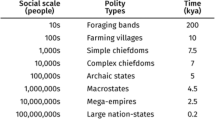Abstract
This chapter tried to demonstrate utility of agent-based simulation (ABS) for the studies of international relations (IR). Traditionally, IR studies have been heavily dependent on historical approaches emphasizing detailed empirical analyses. Although more “scientific” approaches such as mathematical methods and game theories were introduced, empirical approaches are still much more dominant than economics.
However, it is impossibility of verification through experiments in this field, because IR studies have an inherent difficulty. That is, elements of the events discussed in this field are usually diverse and complicated which forces researcher to shed lights on a variety of elements of specific events. To discuss specific events in the detailed way within the framework of a general theory, one would need to make more presumptions, or they have to be replaced with more concrete alternatives. But how can one select appropriate presumption?
ABS model, we are proposing in this chapter, has advantages in overcoming the difficulties we discussed above. We create agents in computer and let them interact with each other within the virtual world setup in a computer. By “cultivating” nations this way, we can reduce, if not completely eliminate, risks of introducing arbitrary presumptions by the model builder. It also allows us to observe dynamic process of interactions of nations or to conduct an experiment of virtual history by obtaining path-dependent properties of agents.
Access this chapter
Tax calculation will be finalised at checkout
Purchases are for personal use only
Similar content being viewed by others
References
Camerer C, Lowenstein G, Prelec D (2005) Neuroeconomics: how neuroscience can inform economics. J Econ Lit XLIII:9–64
Fearon JD (1994) Domestic political audiences and the escalation of international disputes. Am Polit Sci Rev 88(3):577–592
Hayek F (1973) Law, legislation and liberty, vol 1. Routledge, London
Kamiya M (2009) “POST9.11 NO KOKUSAISEIJI NI OKERU POWER,” (Power in international politics Post-9.11). Kokusai Mondai (Int Aff) 586:29–39
Lawson T (1997) Economics and reality. Routledge, London
Marshall A (1890) Principles of economics. Macmillan, London
Nye J (2009) Soft power: the means to success in world politics. Public Affairs, New York
Popper KR (1972) Objective knowledge. The Clarendon Press, Oxford
Schultz KA (1999) Do democratic institutions constrain or inform? Contrasting two institutional perspectives on democracy and war. Int Organ 53:233–266
Smith VL (1976) Experimental economics: induced value theory. Am Econ Rev 72:923–955
Van Evera S (1997) Guide to methods for students of political science. Cornell University Press, New York
Van Evera S (1999) Causes of war: power and the roots of conflict. Cornell University Press, New York
Author information
Authors and Affiliations
Corresponding author
Editor information
Editors and Affiliations
Rights and permissions
Copyright information
© 2018 Springer Nature Singapore Pte Ltd.
About this chapter
Cite this chapter
Egashira, S. (2018). Agent-Based Simulation as a Method for International Political Science: A Way of Expressing Diversity. In: Tadokoro, M., Egashira, S., Yamamoto, K. (eds) Emerging Risks in a World of Heterogeneity. Evolutionary Economics and Social Complexity Science, vol 10. Springer, Singapore. https://doi.org/10.1007/978-981-10-7968-9_8
Download citation
DOI: https://doi.org/10.1007/978-981-10-7968-9_8
Published:
Publisher Name: Springer, Singapore
Print ISBN: 978-981-10-7967-2
Online ISBN: 978-981-10-7968-9
eBook Packages: Economics and FinanceEconomics and Finance (R0)




